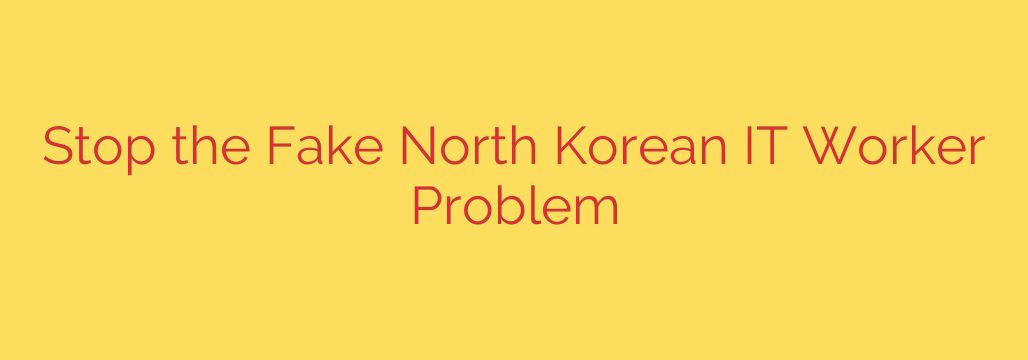
Protect Your Business: Navigating the Hidden Threat of Deceptive Remote IT Workers
In today’s interconnected world, remote work has opened up incredible opportunities for businesses to access global talent. However, this flexibility also comes with complex security challenges. One significant, yet often overlooked, risk involves deceptive IT workers who pose as legitimate contractors or employees but are, in fact, operating under false pretenses, sometimes with ties to hostile foreign states seeking to bypass sanctions and fund illicit activities.
This isn’t a hypothetical threat; it’s a documented reality involving individuals linked to regimes like North Korea. These actors are sophisticated in their deception, using fake identities, VPNs, and proxies to mask their true location and affiliation. They often operate in teams, presenting themselves as individual freelancers or even shell companies to secure remote IT contracts, ranging from software development and mobile app creation to freelancing on various tech platforms.
The primary motivation behind this activity is economic. Severely impacted by international sanctions, regimes like North Korea exploit the global demand for IT services to earn hard currency, which is then reportedly used to fund their weapons programs and support the government. By embedding operatives within international companies, they not only generate revenue but also gain potential access to sensitive data, intellectual property, and internal network infrastructure.
The risks to businesses hiring these deceptive workers are substantial and multifaceted:
- Major Security Breaches: These individuals may introduce malware, create backdoors, or steal proprietary data and trade secrets. Granting network access, even limited, poses an inherent risk if the worker is malicious.
- Financial Loss: Beyond data theft, businesses can suffer direct financial damage from fraud or disruption of operations.
- Legal and Compliance Violations: Hiring individuals linked to sanctioned entities, even unknowingly, can lead to severe legal penalties, fines, and reputational damage under international sanctions laws.
- Reputational Harm: Association with illicit activities, especially those tied to funding dangerous state programs, can severely damage a company’s trust with customers, partners, and investors.
Identifying these deceptive actors can be challenging due to their sophisticated cover. However, vigilance and enhanced security protocols are crucial. Warning signs to look out for include:
- Reluctance or inability to participate in video calls.
- Inconsistencies in identity documents or background check information.
- Requests for payment through unusual channels or third parties.
- Accessing networks from suspicious or frequently changing IP addresses (though VPNs are common for legitimate remote workers, combining this with other red flags is key).
- Overly secretive behavior about their personal life or location.
- Technical skills that don’t align with stated experience or background.
Protecting your business requires a proactive and multi-layered approach:
- Implement rigorous vetting and background checks: Go beyond standard checks. Verify identity through video calls and official documentation. Cross-reference information across multiple sources.
- Strengthen hiring policies for remote workers: Establish clear guidelines for identity verification and require documentation that proves location.
- Enhance cybersecurity measures: Employ robust endpoint detection, network monitoring, and access controls. Limit access based on the principle of least privilege. Monitor user activity for anomalous behavior.
- Stay informed about sanctions lists and compliance requirements: Regularly consult official government resources regarding sanctions and export controls.
- Educate your HR and security teams: Ensure they are aware of these specific threats and the red flags to watch for during the hiring and employment process.
- Consider third-party security expertise: Partner with cybersecurity firms specializing in threat intelligence and supply chain risk management.
In conclusion, while remote work offers undeniable advantages, businesses must be acutely aware of the potential for exploitation by deceptive actors linked to sanctioned regimes. Prioritizing robust security measures and thorough vetting processes is not just good practice; it’s essential for protecting your assets, reputation, and legal compliance in the complex landscape of global remote hiring.
Source: https://go.theregister.com/feed/www.theregister.com/2025/07/13/fake_it_worker_problem/








